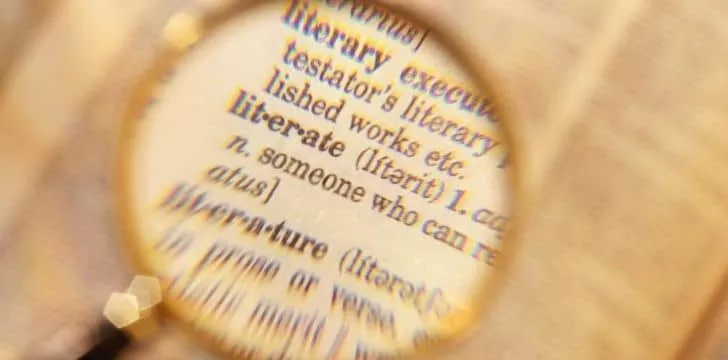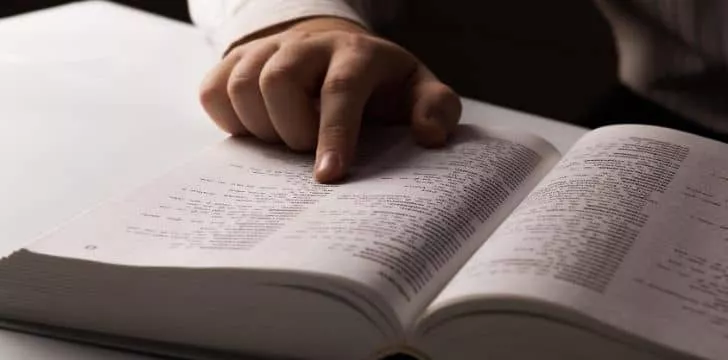A person who compiles words for a dictionary is called a lexicographer.
Do you ever wonder how a word becomes part of the dictionary? Does one person make the decision or does it go through a series of people before being accepted for publication?
In this article, we will explore how a word becomes part of the dictionary.
So, How Does a Word Get into the Dictionary?

Simply, a word enters the dictionary when it becomes commonly used.
New words like slang and abbreviations are included in the dictionary when they appear in numerous sources and are frequently spoken.
Once a word is widely used and has a common meaning, it can be considered for inclusion in the dictionary. However, the process is not instant and can take years to complete.
Who Decides Which Words Go into the Dictionary?

A lexicographer is the person who compiles words for a dictionary.
Lexicographers monitor the use of new words across printed material, online, and spoken word. They collect information about where the word was written, printed, or heard, along with its contextual meaning.
After gathering adequate evidence and finding a solid meaning, the word can be proposed for inclusion in the latest edition of the dictionary.
The Oxford English Dictionary is updated four times a year.
Are There Multiple Dictionaries?

There are various dictionaries available, but the Oxford English dictionary is the most reputable and established for English language.
Oxford dictionaries have existed for a long time, containing roughly 600,000 words and 3 million quotations.
When Oxford began creating their first dictionary, they anticipated it would take ten years to complete. However, it was a much more ambitious task than they realized.
They started working on it in August 1879 and did not complete the final volume until 1928, almost fifty years later.
Can Words Be Removed from the Dictionary?

It is uncommon for a word to be removed from the dictionary. Oxford English dictionaries state that they have never removed a word from their dictionaries.
Instead, if a word becomes outdated or its meaning changes, the word is labeled as obsolete.
The dictionary’s purpose is to document every word that has ever existed in the language it is cataloging.
For example, if you are reading a book from 1920 and come across an unfamiliar word, you can use the dictionary to learn its meaning.
Why Was the Dictionary Invented?

The need to document language has existed for thousands of years. The earliest non-alphabetical dictionary was created by Richard Mulcaster in 1582, containing 8,000 English words. Robert Cawdrey later wrote the first complete English dictionary in 1604, providing documentation of the language and vocabulary of the time. The purpose of these dictionaries was to establish a definitive record of the English language and its word meanings for all to access. The concept of the Oxford English Dictionaries was born out of the Philological Society of London’s decision to document all English words used since the 12th Century in 1857.
Between 500-1000 words are added to the Oxford dictionary annually, and while it may seem like more words are being added nowadays, this may not be the case. As our communication and connection abilities have improved, identifying new words has become easier, making it appear that there are more new words today. Ultimately, any word can be added to the dictionary if it becomes popular across multiple platforms among diverse groups of people and has an established meaning, which can take years to develop.
FAQ
1. What is the process of adding a new word to the dictionary?
Adding a new word to the dictionary is a complex process that involves a lot of research. The word needs to have a significant usage and be widely recognized by the public. The dictionary editors collect data from various sources, including books, newspapers, and online texts. They analyze the frequency and context of the word’s usage to determine its meaning and relevance. Once the word has been approved, it goes through a series of revisions and editing before being added to the dictionary.
2. Who decides which words get added to the dictionary?
The decision to add a new word to the dictionary is made by a team of experienced editors, linguists, and lexicographers. These professionals analyze the data collected and assess the word’s cultural, social, and linguistic significance. They also take into consideration the opinions of the public and other experts in the field.
3. Can anyone suggest a new word to be added to the dictionary?
Yes, anyone can suggest a new word to be added to the dictionary. However, the word needs to meet certain criteria, such as having a significant usage and being widely recognized. The suggestion needs to be submitted to the dictionary’s editorial team, who will then research the word and decide whether it should be added to the dictionary.
4. How long does it take for a new word to be added to the dictionary?
The process of adding a new word to the dictionary can take several years. It involves a lot of research, analysis, and revisions. The editorial team needs to ensure that the word meets all the criteria and is relevant and significant enough to be added to the dictionary.
5. Are there any words that are not allowed in the dictionary?
Yes, there are certain words that are not allowed in the dictionary due to their offensive or derogatory nature. The editorial team has strict guidelines regarding the inclusion of such words and will only include them if they are essential to understanding a particular culture or language.
6. How many words are added to the dictionary each year?
The number of words added to the dictionary each year varies depending on the language and the editorial team’s policies. In English, for example, the Oxford English Dictionary adds approximately 1,000 new words each year.
7. How important is it for a word to be included in the dictionary?
The inclusion of a word in the dictionary is significant as it reflects the evolution of language and culture. It also provides a reference point for future generations to understand the language and its changes over time. Being included in the dictionary can also give a word greater legitimacy and recognition.
8. Can a word be removed from the dictionary?
Yes, a word can be removed from the dictionary if it is no longer relevant or widely used. However, this is a rare occurrence, and the editorial team will only remove a word after careful consideration and research.
9. How do dictionaries keep up with new words and changes in language?
Dictionaries keep up with new words and changes in language by constantly monitoring and analyzing language usage. They collect data from various sources, including books, newspapers, and online texts. They also rely on feedback from the public and experts in the field. The editorial team is always updating and revising the dictionary to reflect the changes in language and culture.

Zayn Anderson is a prolific writer with a passion for uncovering the world’s intriguing facts. Armed with an insatiable curiosity, he delves into various subjects, from history and science to nature and technology.
